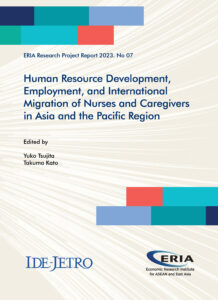The population in Asia is aging, resulting in an increased demand for nurses and care workers. Consequently, the capacity of healthcare and long-term care needs to expand to properly treat this expanding population in Asia and meet their demand. As some countries cannot do so domestically, they seek to recruit nurses and caregivers overseas. Against this backdrop, this study published by ERIA examines how both ‘exporting’ and ‘importing’ countries of migrant workers in the health and long-term care sectors can achieve a mutually beneficial situation in the post-COVID-19 pandemic era. It is important to understand the dynamically changing situations and challenges in terms of training and employment of nurses and caregivers in ‘exporting’ and ‘importing’ countries. The report focuses on Asia as a major ‘exporting’ and ‘importing’ region for nurses and caregivers: with Cambodia, India, Indonesia, Malaysia, the Philippines, and Vietnam representing the ‘exporting’ countries and with Australia, New Zealand, and Japan representing the ‘importing’ countries.


